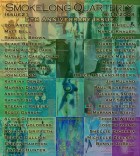R.’s kid was being chased around by the nanny in the pen of a back yard.
“Yard Boy,” somebody said to R.
It was a proposal for an album title.
“Wee!” offered somebody else. “With an exclamation point.”
R. stared out at his kid.
If we made our proposals unseriously, they could be safely despised.
All this was in May. We’d been on the road that month. On the road, R. liked to have me come around from the kit at the end of a show and display my palms, which commonly bled by that point. People roared. They took cell phone video of my cracked and bleeding hands. It was all over the internet.
By late May, I was healing, though. I had a prescription lotion that I’d rub in every morning. I did this out front, on the stoop, in the warmth and glare of the empty cul de sac.
“How do you fucking open this thing?” R. called down one morning. He was talking about the screen in the window of the bedroom he’d claimed.
“Dunno.”
Something broke. I heard it. I saw the screen frisbee down into the grass.
“How about this?” I called. “Pink cover. Textured pink of kiddie stationery. Nothing on it but the name of the band. Typewritten. The letters not quite lining up.”
I’d known R. longest. There was to my notion a basicness and audacity I thought he might like.
But I didn’t look up at him. I lifted my face to the sun. I squinted. I let my eyes close.
Another time when I was sitting out there the Range Rover pulled in, and the nanny got out. Her name was Melinda. She wore sandals, jean shorts and a big Duke sweatshirt. I watched her get Cal, who was two and a half, from the car seat. Something about the size of a heart was swinging in a bag she had in one of the hands she’d crossed beneath the kid’s puffy bottom.
“What’s that?” she asked about the lotion—which in the long sun had the smell of eucalyptus.
I explained.
She lifted her shades. “Why don’t you wear gloves?” she asked.
I looked at her. I nodded my head.
Melinda had something R’s lawyers had approved. Experience of some kind, a degree. Cal’s mom, Leena, was in rehab, and the lawyers were worried about Child Welfare.
Another time we were out back on the patio. It was balmy. It was right around dusk. Toop had set up a pony keg and passed around a refill of vikes. R. had dragged out a portable amp and one of Toop’s high-school guitars and was making sound. This writhing feeler of sound that moved into people’s back yards.
“Worm,” pronounced Toop, on his back in the grass. “‘Worm,’ let’s call it.”
I was doing a Sudoku in the last of the light.
On the picnic table R’s cell phone jumped. Leena had been calling all day, sending pictures of her tits with scrolls of quick-text: “What’s up? Whacha doing? What do you think? You’re the best! Whacha doing? What’s up?”
I let my pen fall, as the vikes were starting to affect my ability to think in numbers. That’s when Melinda appeared in the yard and picked her way, barefoot, through the buzzed grass as if she was walking in gravel. Everybody looked at her. Even R, who’d had his eyes closed. He stopped playing, set down the guitar.
“Is that too loud?” he asked her.
“No, not at all.”
“Sorry.”
“No, really,” she was trying to say.
From the look on R’s face, though, the nanny could see that this wasn’t one of her options.
The morning of the shoot, R. stood at the windows again, watching Cal slide to Melinda.
The photographer showed. He didn’t look like a lawyer, but he couldn’t have fared worse if he had. He wore khakis and a fresh white T-shirt bearing the raised logo of the Hard Rock Café.
“Where do you want to do this?” he asked.
R. read his T-shirt aloud.
“Someplace particular you have in mind?”
“Guess it’s some really, really hard rock they play at the Hard Rock Café.”
The photographer grinned.
“Seriously,” R. said to him.
“Seriously what?”
“You must be a fucking idiot to decide to wear that T-shirt here.”
R. left the job of mollifying the photographer to everyone else. He walked outside. He walked into the cul de sac, which was maybe the flattest and most shadeless part of the whole flat shadeless place.
We did the shoot there. The photographer was smart enough not to express his concerns about traffic. There was no traffic anyway. It was just us in the cul de sac, looking at houses where everyone, we were certain, was looking right back.
Melinda came out, carrying Cal.
R. lifted his arm their way.
She put the kid down. Slowly he walked towards his dad.
“No,” R. told her. “You too.”
That night on the patio, R. hadn’t sent her away. She’d stood there a second and looked at the sky, then gone in through the sliding glass doors when she started to feel implicated in the lack of activity.
Since then I hadn’t seen her even look at anybody but Cal.
Still she did what R. said. Stood behind Cal, with a hand on his shoulder. Leaned back into R., who stood with spread legs so his hands could come down around the crests of her hips without him having to lean.
The photographer looked at us, obviously hoping to find information about how to respond.
“Some kind of American Gothic deal?” he tried.
R said, “What did you say?”
“Look, man,” said the photographer. “I’m just trying—”
“No, no,” said R, eyes shining and wild. “No, no. Say that again.”



 The core workshop of SmokeLong Fitness is all in writing, so you can take part from anywhere at anytime. We are excited about creating a supportive, consistent and structured environment for flash writers to work on their craft in a community. We are thrilled and proud to say that our workshop participants have won, placed, or been listed in every major flash competition. Community works.
The core workshop of SmokeLong Fitness is all in writing, so you can take part from anywhere at anytime. We are excited about creating a supportive, consistent and structured environment for flash writers to work on their craft in a community. We are thrilled and proud to say that our workshop participants have won, placed, or been listed in every major flash competition. Community works.